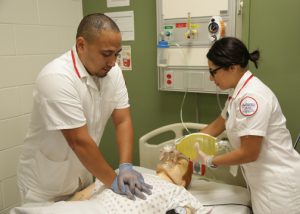(HARLINGEN, Texas) – The state and national shortage of registered nurses is increasing, with 203,000 job openings projected nationally through 2026, according to onetonline.org. And the Dallas Observer recently reported that Texas will have the second-largest shortage in the country.
TSTC’s Director of Nursing Shirley Byrd said most of the program’s grads are hired before they even graduate, with an average starting salary of $35 an hour.
The program, which debuted in 2017, will see its second graduating class this August. Byrd said she is excited to see the program continue to grow, and she explained what a student can expect when they are accepted into the program.
What is the length of the program?
The associate degree in nursing at TSTC is a three-semester or one-year program. To apply for acceptance into the program, a person must already be a licensed vocational nurse (LVN).
What can a student expect when they graduate?
When a student successfully completes the program, they will receive an associate degree and be eligible to sit for the National Council Licensure Exam to receive their license in nursing and be able to work.
What skills do you learn in the registered nursing program?
Students entering the program will already have learned the foundation of nursing as a vocational nursing student, so as a registered nursing student they will learn advanced critical care skills, such as critical care nursing, emergency room nursing, and IV therapy. These skills and more will allow them to become skilled and professional nurses who will find success in the field.
What types of technology are used to teach these skills?
We use advanced technologies such as resource books and assessment software, Health Education Systems Incorporated (HESI) test reviews and progression software, and simulated labs equipped with mannequins that can be programmed to mimic a real-world scenario that nursing students must respond to.
How do these skills prepare a student for the workforce?
By learning these skills in the classroom, nursing students can then apply them and be better equipped for their clinical and hospital rotations that progress from bedside care to advanced critical care. Student rotations are in areas such as medical, surgical, obstetrics, pediatrics, psychiatry, and emergency rooms.
What kinds of positions can a graduate from this program obtain, and where can they work?
The program’s two largest placement partners are Valley Baptist Medical Center and Harlingen Medical Center, but students have also been placed in local doctor clinics, home health companies, nursing homes, day surgery clinics, and schools.
